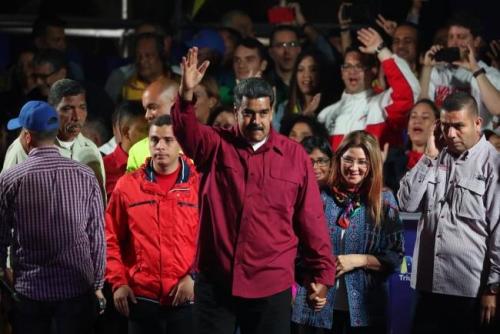Venezuela wins in the elections and faces new challenges
After twenty years in power, the Bolivarian movement founded by Hugo Chávez continues to face the same adversary: the United States
- Análisis

The overwhelming victory of President Nicolás Maduro and his United Venezuelan Socialist Party (PSUV), in last Sunday’s elections, was hardly surprising. Three elements explain the electoral victory of the ‘Chavists’ in the fatherland of Bolivar. In the first place, the Venezuelan people are convinced that the solution of the crisis is in their own hands. In the second place, an insensitive political opposition believes that the solution of the crisis is in the hands of the United States. In the third place, Washington and President Trump believed that the crisis would end with threats of a military intervention. They were sure that the people would ‘not come down from the hills’ to vote.
Nevertheless, after twenty years in power, the Bolivarian movement founded by Hugo Chávez continues to face the same adversary: the United States. Thus was the case with other independent governments since Perón (Argentina) and Arbenz (Guatemala), to Lugo (Paraguay), Zelaya (Honduras), and Dilma (Brazil) in the 21st century, also including Bosch and Camaño (Dominican Republic), Torres (Bolivia) and Allende (Chile). All of them confronted the United States and were defeated by the enormous US military and economic machine. The only exception was Cuba that counted on an exceptional leadership of the women and men who accompanied Fidel Castro.
The inheritors of Chávez, headed by Maduro, seek to emulate Fidel. They count on the support of a people hardened by a thousand battles, from Simon Bolivar to the present.
The votes have been recounted and before Maduro was proclaimed president for the second time, president Trump announced new economic ‘sanctions’ to choke the Venezuelan economy. On this occasion, the objective of the White House is to strike directly at Venezuela private enterprise. They have been suffocating Venezuelan people, over 35 million inhabitants in the country, for many years. The United States have blocked the entry of foods, medicines, building materials and even luxury goods. European countries have been obliged by Washington to follow their instructions, closing transoceanic trade routes. Latin American countries have been more reticent, but they are submitting to the orders from the North.
In the case of Panama, when the United States twisted their arm, the government officials of the Isthmus obeyed orders and blocked financial operations of Caracas in the Panamanian banking centre. Maduro immediately reacted with measures of retaliation and obliged Panama to retreat. Last week, in another ill-conceived venture, the Panamanian government promised the Israeli government that they would open the case of an aircraft that crashed with businesspeople of Jewish origin who were travelling from Panama City to the Colon Free Zone.
President Trump announced that all Venezuelan enterprises – related with extraction, processing and distribution of petroleum and its derivatives – would not have access to financing from banking networks that operate in the United States. Venezuelan private enterprises depend on credit lines of US banks that operate based on the guarantees that offer present and future production of Venezuelan petroleum.
It was these same decisions that President Kennedy made in 1960 against the Cuban Revolution that intensified the crisis between those two countries and provoked the exodus of businessmen from the island. A year later Kennedy launched the military attack against Cuba that was defeated in the Bay of Pigs by the Rebel Army.
The United States has two very hot war scenes at present. On the one hand, Trump threatens North Korea that it will have to surrender, with or without negotiations. On the other hand, Secretary of State Pompeo has called for the people of Iran to rise against the ‘Ayatolas’. He proposes that an “alliance between Arabs and the State of Israel should put an end to the regime of Tehran”.
In South America, Washington believes that with allies such as Argentina, Brazil and Colombia, they can invade Venezuela. These countries would make the first move to open the way for the Southern Command that already has special troops in the Dutch islands of the Caribbean, Panama, Honduras and Florida.
The electoral victory of Maduro was decisive, but the United States is prepared to engage in battle on another plane. The Venezuelan people can defend themselves and Our America will know how to provide the solidarity necessary to reject any invasion.
24/05/2018
(Translated for ALAI by Jordan Bishop)
- Marco A. Gandásegui, Jr., Professor of Sociology with the University of Panama and Associate Researcher with the Centro de Estudios Latinoamericanos Justo Arosemena (CELA)
http://marcogandasegui2017.blogspot.com/
Del mismo autor
- La pandemia no es el fin del capitalismo 23/04/2020
- Hay que masificar las pruebas contra un virus clasista 19/04/2020
- ¡Qué falta hacen los Comités de Salud de J. Renán Esquivel! 09/04/2020
- La desigualdad social y la desconfianza contribuyen a la epidemia 02/04/2020
- Hacen falta más ‘pruebas’ para ‘suprimir’ el coronavirus 26/03/2020
- La crisis del capitalismo y el coronavirus 19/03/2020
- Urge una movilización general para atacar el corona-virus 12/03/2020
- Se necesita liderazgo y transparencia para enfrentar el corona-virus 05/03/2020
- EEUU veta relaciones entre Panamá y China 27/02/2020
- Roberto Arosemena, sus ideas perduran y sus luchas continúan 20/02/2020
Clasificado en
Clasificado en:
Elecciones
- Zoe Alexandra 27/01/2022
- Aída García Naranjo Morales 22/12/2021
- Francisco Domínguez 21/12/2021
- Fernando de la Cuadra, Aglae Casanova 20/12/2021
- Francisco Domínguez 13/12/2021








